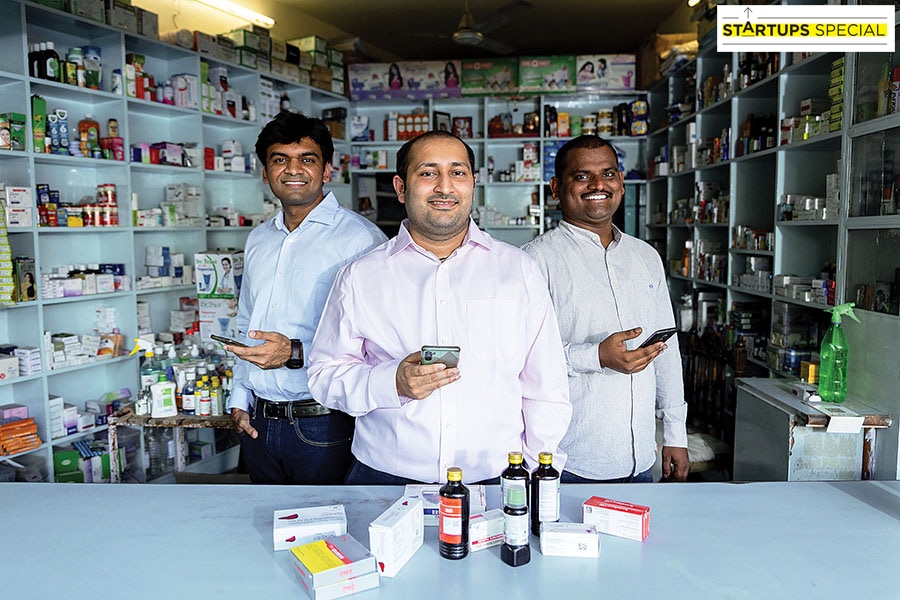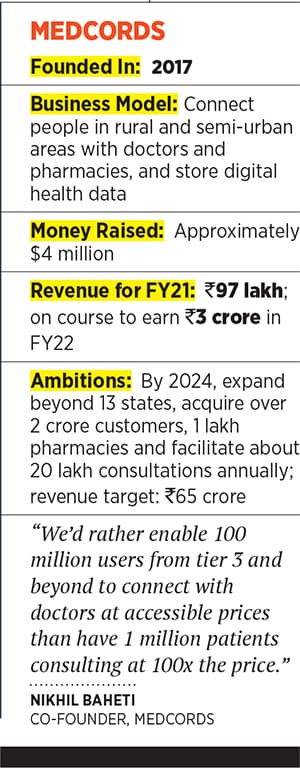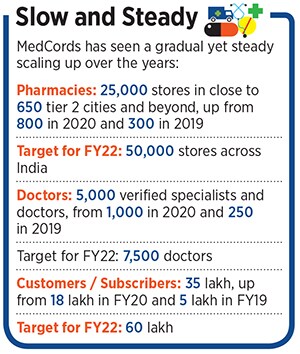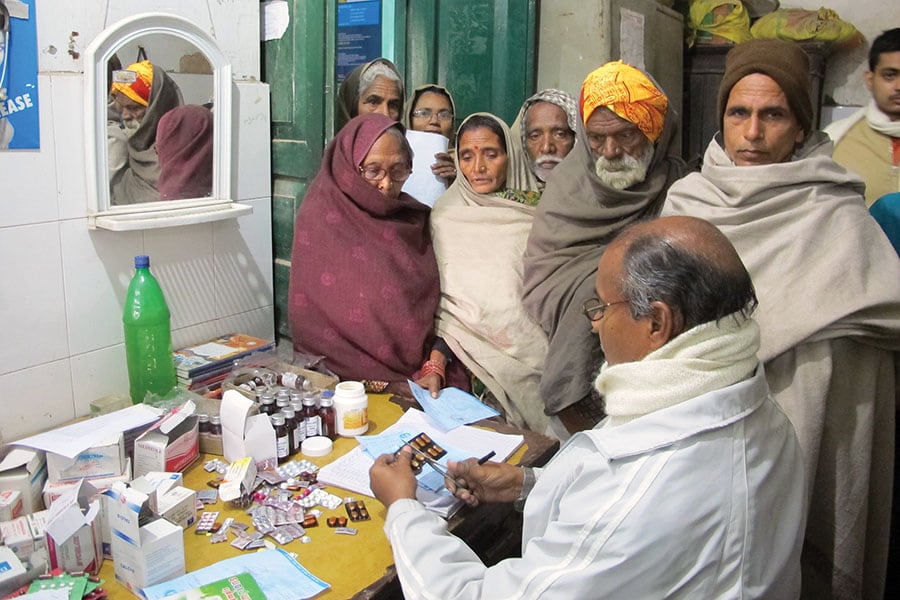The co-founder of real estate startup NoBroker.com, a Bengaluru resident, managed to get a diagnosis online, but wanted medicines to be delivered home to his parents at the earliest. He turned to a fledgling platform he had heard of, called Aayu, which guaranteed quick medicine delivery in tier 2 cities and beyond. He downloaded the app, entered the location and placed an order, following which a pharmacy nearest to his parents’ home gave them the medicines within the next two hours. “That’s when I realised the people behind this platform are building something extremely unique," he says. By October 2020, Gupta became an angel investor in MedCords, the startup that developed the Aayu app.
Health tech in India is primarily medicine delivery or online consultation, Gupta explains, and larger startups usually dispatch medicines through a central warehouse that might take at least a day or two to deliver, depending on the location. “Plus, these larger health tech products are not available in all pin codes and in villages. This solution by MedCords works well for Bharat, for tier 2 and 3 cities and beyond," says Gupta, who has since also subscribed to an annual doctor consultation plan on the Aayu platform.
Now, his parents avail diagnosis at home and also store all their health records digitally on the app. Medicines reach home within 10 to 15 minutes too, as the local pharmacy undertaking the delivery has developed a connection with them and is aware of the requirements. “During Covid, when you really cannot step out, this has been a boon for my parents," Gupta says.
![]() MedCords was also developed out of a personal need. Co-founder Shreyans Mehta’s father suffered from a slipped disc in 2014 and could not go to a hospital. While Mehta arranged a video consultation, the experience made him think about people who did not have access or know-how of such technologies. He realised how many villagers spent between ₹800 and ₹1,000 just travelling to and from cities for the most basic of consultations, and others often turned to local quacks.
MedCords was also developed out of a personal need. Co-founder Shreyans Mehta’s father suffered from a slipped disc in 2014 and could not go to a hospital. While Mehta arranged a video consultation, the experience made him think about people who did not have access or know-how of such technologies. He realised how many villagers spent between ₹800 and ₹1,000 just travelling to and from cities for the most basic of consultations, and others often turned to local quacks.
Mehta, an engineer from Manipal Institute of Technology, soon travelled to villages in Rajasthan, Uttar Pradesh, Bihar and Madhya Pradesh to understand the possibilities of health tech in rural areas. He wanted to build a solution that would help villagers and residents of small towns find qualified, trustworthy doctors, and also medicines prescribed to them. The absence of health records with people and local government institutions encouraged him to think of ways he could also digitise records to identify and predict health trends. Multiple aspects of the problem had to be covered, because solving one problem while leaving out others would make people turn to cities again.
In 2017, Mehta tried to provide a solution through MedCords, which he founded along with Nikhil Baheti and Saida Dhanavath. Baheti and Mehta are childhood friends, while the former and Dhanavath worked together at cloud data protection unicorn Druva. Baheti is a computer science graduate from BITS Pilani, while Dhanavath has a masters of technology degree from IIT-Bombay. All co-founders are first-generation entrepreneurs in their early thirties.
MedCords, a cloud-based health management platform, provides an end-to-end ecosystem, from consultations to medications. “Ignorance, lack of education and low accessibility to medical services are the main issues with rural India. Timely and easy consultations with doctors could prevent a problem, or help people identify and correct it much earlier, and spend a lot less money," says Dhanavath, who designed and developed the tech stack for the startup with the philosophy that not everything needs to be a groundbreaking discovery. “Sometimes, we just need to use the right tools available and build technology in a way that makes it easier and equitable for people to access."
In 2018, the startup raised close to $1 million in seed funding from Info Edge India, WaterBridge Ventures, CIIE (a Centre of Excellence backed by the government’s Department of Science and Technology) and angel investors. Its latest funding round was in March 2020, when it raised $3 million from Info Edge India, WaterBridge Ventures, RVCF and Astarc Ventures.
![]() Today, MedCords has a network of about 25,000 pharmacies in 650-odd towns and cities across 13 states, and close to 5,000 doctors and specialists on their platform. They are mostly present in North and Central India. The medicine delivery follows a hyperlocal model, which reduces the delivery time to approximately 60 minutes, the founders claim. To ensure people are able to consult doctors within 30 minutes, a case is floated to all relevant specialists on the network until a doctor takes it up. The customer base is over 3.5 million people this year, up from 0.5 million in FY19 and 1.8 million in FY20.
Today, MedCords has a network of about 25,000 pharmacies in 650-odd towns and cities across 13 states, and close to 5,000 doctors and specialists on their platform. They are mostly present in North and Central India. The medicine delivery follows a hyperlocal model, which reduces the delivery time to approximately 60 minutes, the founders claim. To ensure people are able to consult doctors within 30 minutes, a case is floated to all relevant specialists on the network until a doctor takes it up. The customer base is over 3.5 million people this year, up from 0.5 million in FY19 and 1.8 million in FY20.
“MedCords is building a connected ecosystem of patients, doctors and pharmacies focussed on rural and semi-urban India, which can be a unique moat and provide defensibility over the long run," says Ashish Jain, partner at WaterBridge Ventures.
Long Road to Building Trust
About 69 percent of India’s 1.34 billion population lives in rural areas, according to the 2011 Census. On paper, the public health system in these regions is a detailed structure with multiple levels: First, sub-centres cater to about five villages with a population between 3,000 and 5,000. Second, there are primary health centres (PHCs) for every six sub-centres, followed by community health centres (CHCs), sub-district and district hospitals. Then come the medical colleges. This system, however, suffers from several shortcomings that have been laid bare by the pandemic, which has in turn exacerbated health care delivery challenges in these areas.
An August 2020 report by the Confederation of Indian Industry (CII), titled ‘Strengthening Public Health Delivery’ says that issues in the country’s public health systems include shortage of skilled doctors and nurses, auxiliary nursing midwives (ANM), assisted social health activists (ASHA) and anganwadi workers, apart from lack of equipment and diagnostic tools.
Despite the pandemic putting greater pressure on health care systems, budgetary allocations are not looking too bright either. As per PRS Legislative Research, out of the ₹71,269 crore outlay for the Department of Health and Family Welfare for 2021-22, allocation for the National Rural Health Mission (NRHM) stands at ₹30,100 crore, only a 0.2 percent annual increase over 2019-20.
The budgeted estimates for the Pradhan Mantri Jan Arogya Yojana (PMJAY), which covers Ayushman Bharat and health and wellness centres, stand at ₹6,400 crore. The Union government aims to build 1.5 lakh health and wellness centres by 2022 in a bid to strengthen primary health care systems. Out of this, as per government data on May 25, only 76,012 centres have been built so far.
Experts stress on building an infrastructure with strong linkages between primary, secondary and tertiary health care sectors. Startups like MedCords want to specifically target strengthening of the primary care delivery mechanism in its last mile, using technology. The founders, however, also realise technology implementation without hand-holding and building trust within the community will not take them far in rural areas.
Trust, therefore, becomes the key word—and perhaps the biggest challenge in the way of scale and revenue—for health tech startups whose play is solving needs for rural India. As Gupta puts it, “There are multiple revenue channels. When customers start trusting you, you can expand your offerings to alternate medicines or even stock nutrition and wellness products," he says. “There is a business play catering to Bharat, but it’s very tough."
MedCords, therefore, has put people running pharmacies at the centre of their business model in order to build trust and credibility. Pharmacists use the Sehat Sathi app built by the startup to onboard people in rural areas who are not tech savvy or do not have access to smartphones.
For example, 36-year-old Anupam Kumar Rachhoya runs the Ganpati Medical Stores in the small town of Reengus in the Sikar district of Rajasthan. “In a week, at least eight to 10 people from Reengus and nearby areas come to me to help them book appointments with doctors. I connect them with general physicians, cardiologists, gynaecologists, or any other specialist as per their requirement. I enter their health details in the app, create their digital record, arrange for consultation, and also give them medicines as per prescription," he says.
The hyperlocal medicine delivery service model by MedCords, additionally, helps Rachhoya cater to more customers who book orders via the Aayu app. “I get to keep whatever I earn through medicine sales, and do not have to pay commission to the platform, which is unlike larger companies" he says.
MedCords does not intend to charge pharmacists, in a bid to increase their customer base. This is despite the annual gross merchandise value (GMV) of medicines sold via their platform standing at ₹30 crore as of May, and between 3,000 and 4,500 people ordering medicines from the app daily.
![]() Health care centres in rural areas have various shortcomings, which have been exacerbated by the pandemic
Health care centres in rural areas have various shortcomings, which have been exacerbated by the pandemic
Image: Rama Lakshmi / The Washington Post via Getty Images
“In rural areas, people rely on local pharmacists when it comes to health matters, so the latter become ambassadors who tell customers about our platform, and add to the brand value and recognition," says Baheti. Each pharmacy, he explains, caters to at least 500 to 1,000 families. “Their high trust value helps us get users who would otherwise be difficult to reach through any other form of marketing. Our customer acquisition cost is just between ₹10 and ₹13, easily the lowest in the industry. Companies in urban areas spend at least ₹500 to ₹600 to acquire a customer," he claims.
The revenue, therefore, comes purely from consultations and subscriptions. First consultation is priced at ₹99, and at ₹125 for subsequent requests. They also provide annual family plans priced at ₹499 for five consults, ₹899 for 12 and ₹1,249 for 25 consultations. MedCords revenue for FY21 stood at ₹97 lakh, up from ₹41 lakh in FY20 and ₹7.8 lakh in FY19.
Baheti says their business model is built to keep consultation charges low. “The nature of our customers’ medical needs in tier 3 and beyond is primary and early-stage. If we bring ease of access, we will gradually see a game play at a volume that will generate high revenue," he says, explaining that they want 100 million users to be able to connect to doctors in 30-odd minutes at accessible prices rather than have 1 million patients consulting at 100x the price.
“We are already seeing a surge in people who come for repeated consultations and subscribe to annual plans," Baheti says. Between 1,000 and 1,100 people consult doctors via the app every day, up from 200 people pre-pandemic.
The startup is on track to clock an estimated revenue of ₹3 crore in FY22, the founders say. Their long-term plan to increase revenue includes distribution. “As medicine sales happen through our platform, we will analyse [hyperlocal] trends and directly source medicines in demand from pharma companies for our local partner stores," says Mehta.
Investors are standing by the startup. “As the model scales, it is serving as a source of income augmentation for small-time rural pharmacies, which are not only acting as point of last mile fulfilment, but also emerging as a SPOC [single point of contact] for enabling digital consultations and connecting patients to the NDHM [National Digital Health Mission], and procuring health insurance for them," says Jain of WaterBridge Ventures.
Over the next three years, MedCords wants to add 2 crore users and 1 lakh medical stores to their network, and take revenue up to ₹65 crore by facilitating more than 20 lakh consultations annually. Mehta, who grew up in a family of doctors, knows that it is loyalty that often creates legacy in rural health care. Building loyalty in this market takes time, and MedCords is playing the long game.
â— With additional inputs from Rajiv Singh

 (From left) MedCords co-founders Nikhil Baheti, Shreyans Mehta and Saida Dhanavath
(From left) MedCords co-founders Nikhil Baheti, Shreyans Mehta and Saida Dhanavath MedCords was also developed out of a personal need. Co-founder Shreyans Mehta’s father suffered from a slipped disc in 2014 and could not go to a hospital. While Mehta arranged a video consultation, the experience made him think about people who did not have access or know-how of such technologies. He realised how many villagers spent between ₹800 and ₹1,000 just travelling to and from cities for the most basic of consultations, and others often turned to local quacks.
MedCords was also developed out of a personal need. Co-founder Shreyans Mehta’s father suffered from a slipped disc in 2014 and could not go to a hospital. While Mehta arranged a video consultation, the experience made him think about people who did not have access or know-how of such technologies. He realised how many villagers spent between ₹800 and ₹1,000 just travelling to and from cities for the most basic of consultations, and others often turned to local quacks. Today, MedCords has a network of about 25,000 pharmacies in 650-odd towns and cities across 13 states, and close to 5,000 doctors and specialists on their platform. They are mostly present in North and Central India. The medicine delivery follows a hyperlocal model, which reduces the delivery time to approximately 60 minutes, the founders claim. To ensure people are able to consult doctors within 30 minutes, a case is floated to all relevant specialists on the network until a doctor takes it up. The customer base is over 3.5 million people this year, up from 0.5 million in FY19 and 1.8 million in FY20.
Today, MedCords has a network of about 25,000 pharmacies in 650-odd towns and cities across 13 states, and close to 5,000 doctors and specialists on their platform. They are mostly present in North and Central India. The medicine delivery follows a hyperlocal model, which reduces the delivery time to approximately 60 minutes, the founders claim. To ensure people are able to consult doctors within 30 minutes, a case is floated to all relevant specialists on the network until a doctor takes it up. The customer base is over 3.5 million people this year, up from 0.5 million in FY19 and 1.8 million in FY20. Health care centres in rural areas have various shortcomings, which have been exacerbated by the pandemic
Health care centres in rural areas have various shortcomings, which have been exacerbated by the pandemic